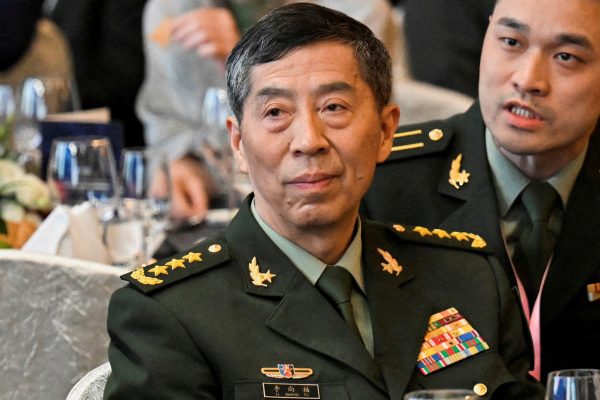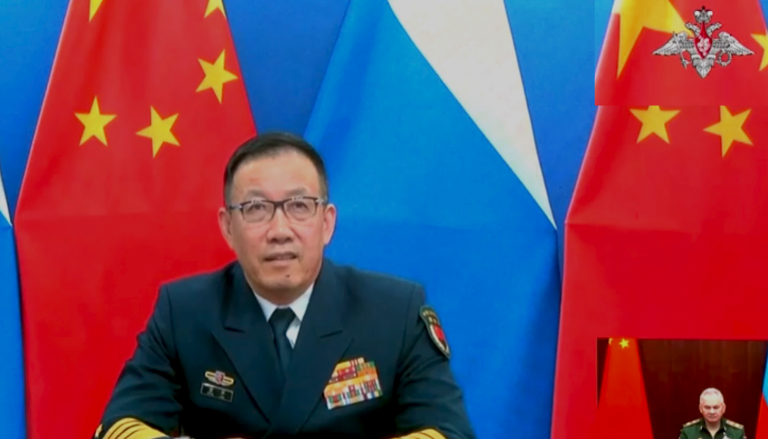In a video conference with his Russian counterpart, Communist China’s new Minister of Defense, Dong Jun, emphasized the backing Beijing has afforded Russia since the Kremlin began its invasion of Ukraine in early 2022.
“We have supported you on the Ukrainian issue despite the fact that the U.S. and Europe continue to put pressure on the Chinese side,” Dong told Russian Defense Minister Sergei Shoigu on Wednesday, Jan. 31, according to Russia’s state media TASS.
He added that even though “defense cooperation between China and the European Union is [now] threatened,” the Chinese Communist Party (CCP) would not “change or abandon our established policy course over this.”
Dong, formerly an admiral in the communist People’s Liberation Army (PLA) Navy, became defense minister last December, following the disappearance of his predecessor Li Shangfu in August.
Li is believed to have been sacked for corruption, something notable given that he was seen as a handpicked ally of CCP leader Xi Jinping.
- Fear in the Forbidden City: Disappearances among top leadership raise questions about the stability of Chinese Communist Party rule
Success
You are now signed up for our newsletter
Success
Check your email to complete sign up
The meeting between Dong and Shoigu also saw the two military officials reaffirm the partnership between Beijing and Moscow.
Shoigu said that “currently the relations between Russia and China [are] witness[ing] the best period in their history.”
Dong told Shoigu that the Chinese and Russian militaries will “promote bilateral military relations to reach an even higher level, in order to play an even bigger role in upholding global security and stability,” according to the Chinese defense ministry readout.
- Russia’s Ally Belarus Cozies Up to China
- China Exploits Sanctions Loophole to Siphon Millions’ Worth of Military Gear to Russia: Politico
The militaries of China and Russia held joint air and sea drills in the Sea of Japan in July, while South Korea had to scramble fighter jets when Chinese and Russian military planes entered its air defense zone last month.
A crucial element of Dong’s job is to engage with the United States military to reduce the risk of conflict over Taiwan and the South China Sea
‘Strategic partnership’
Xi Jinping and Russian president Valdimir Putin have in their many interactions emphasized the close “strategic partnership” between Beijing and the Kremlin, but the People’s Republic of China (PRC) has found itself in an awkward international position owing to its close ties with Russia in recent years, even prior to the invasion of Ukraine.
Li Shangfu, the ex-defense minister, was sanctioned by the U.S. in 2018 for handling an arms deal with Moscow for Su-35 fighter jets and S-400 long-range antiaircraft missiles the previous year. Despite this, he was promoted to PRC Minister of National Defense in 2023 before losing the role.

Following the invasion of Ukraine, China — whose economy is relatively dependent on exports to the U.S. and other countries — has come under Western pressure for refusing to denounce the Kremlin, as well as for continuing to sell supplies to Russia. The U.S. has blacklisted multiple PRC entities for such dealings, and American officials warn Beijing against delivering weapons to its northern neighbor.
Though China is an increasing consumer of Russian natural resources, the CCP’s diplomatic commitment to Russia may not be reciprocated by Moscow in full.
- Russian Consumers Slow to Accept Shift to Chinese Cars and Other Goods
- US Imposes Sanctions on China and Russia, Citing Abuses and Corruption
In his conversation with Dong, Shoigu denied that the partnership between Russia and China amounted to a formal defense arrangement, saying that “contrary to certain Western states we do not form military alliances.”
Apart from China, Russia has been strengthening its relationship with North Korea, the isolated and nuclear-armed totalitarian state. South Korean officials believe that much of North Korea’s recent progress on ballistic missiles and space rockets has been thanks to Russian technical assistance.
Though TASS and other Russian media outlets reported Dong’s backing on the “Ukrainian issue,” CCP-controlled sources appeared to downplay or omit these details.
Reuters contributed to this report.















